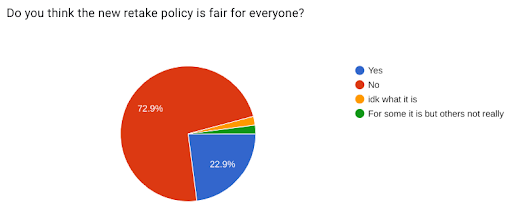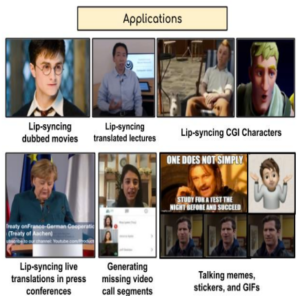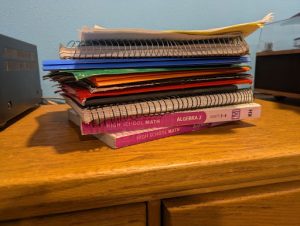100% of the Knowledge; Only 85% Counts

Fake retake test image created to represent what the policy could do.
December 16, 2022
Imagine the first day of the 2022-33 school year. Teachers go through their syllabi one by one, saying basically the same thing every time. Until they get to the retake policy. Instead of hearing that retakes are allowed and you just need to fill out a form and have your homework done, you hear a mixture of new requirements along with the thing that shocked most students, “the score entered into the gradebook will be the highest earned score but may not exceed 85%.”
SPASH Administrators have been working to create a new retake policy “behind the scenes” for quite a while, seeing that almost no students were aware of it, but they have finally implemented it. This new retake policy has changed the way SPASH students and teachers look at and use retakes in their classrooms. Furthermore, both students and staff have important opinions regarding this new, partially unexpected change. It is important for those opinions to be out there and heard, seeing that students are being used as a testing stage for the future of SPASH retake policies.
Wait, so what actually changed?
While observing the SPASH syllabi, they all had one main change in common, “the score entered into the gradebook will be the highest earned score but may not exceed 85%.” This is probably one of the biggest changes that affects students, and their success, the most.
One reason the retake policy needed some rethinking was because, “not having a specific one allowed it to be so different that it caused an issue for students,” as Ms. Melville, SPASH assistant principal, expressed. There were definitely a lot of inconsistencies from class to class, which did make it confusing for some of the students, but there is always another side to the story.
For some teachers, the freedom to create a retake policy of their own allowed them to create the most successful environment in their classroom that nurtured student learning. While most allowed you to retake by emailing your teacher and asking to, or filling out a retake form, some had more requirements, and some had less. Teachers made it whatever they needed to be.
Now however, there are many more requirements such as: asking the teacher in person, studying the whole unit over, and actually taking it within a specific number of days. You would do all this work, just to earn at most an 85%, even if you do the work and studying to earn a 100%.
Thankfully, that ability to change the policy based on student needs, as previously mentioned, did not completely go away. Ms. Melville informed, “there is still some teacher discretion on those [the retakes], teachers can still make the ultimate choice.” In other words, if students have specific situations, where the normal retake policy is not best fit, teachers have the ability to make an exception and create different requirements for that student.
How does everyone feel?
The students and staff at SPASH have varying opinions and ideas of what the new retake policy has done and how it has affected the students.
One example of a student opinion, shared by SPASH student, Peyton Wanta, is regarding the level of importance of this change. “It’s crazy that they adjusted it and discussed this before any of the safety issues at SPASH, like the parking lot or cleanliness of the school.” In short, it is important for students to have a consistent retake policy, but considering all of the issues SPASH has, it doesn’t seem fitting for the retake policy to be #1.

In a survey of 47 SPASH students, 74.5% believe that the new retake policy is unfair. This means approximately ¾ of the student population at SPASH are not okay with the new retake policy. Based on the short answer question, most of the students are upset and confused as to why they felt the need to set an 85% cap.
While discussing the importance of changing the retake policy, Hanah Netys, a SPASH student, points out, “they did it for the few students who rely on it too much. For the students that do try it has really negative effects.” For example, there were definitely situations of people who wouldn’t do work, wouldn’t study, and wouldn’t try on tests. They wouldn’t do these things just because they knew they could just retake it and get a passing grade. Usually though, that does not represent all students, hence many feel like the new policy doesn’t help anyone.
One of the surveyed students argues, “I think we should get a full 100% if we’re taking time to get better on the subject we have learned and want to retake the test.” This new policy leaves many wondering why students are being punished for learning and fixing their mistakes. Not everyone is perfect the first time, and not having the comforting net of knowing that the test you are taking at the moment isn’t the “end all be all” makes it hard to be calm and prepared.
Not to mention, unfortunately it seems that often students aren’t in very much control of knowing what will or will not be on tests. That makes it almost impossible to be completely prepared. Having to make and teach all the material is hard, but having to learn it all and figure out what is most important, then memorize it for 7 different classes is hard too.
Both Hanah and Peyton expressed that the retake policy is not fair for students who might have had an off day and messed up something silly on a test, or weren’t aware something super specific was going to be on the test, and it results in not getting a grade that accurately reflected what students truly knew. Ultimately this change doesn’t allow the retake policy to be the forgiveness and cushion some students need when they make mistakes.
What’s the overall conclusion?
Students are not just upset at the retake policy because it changed, they are upset because of what it changed to. The new policy took away the forgiveness aspect of retakes, which seemed to be the whole reason for retakes in the first place.
On the other hand, Ms. Melville hopes that the new policy “encourages them [students] to prepare more, and if they don’t know or feel prepared,” they make sure to communicate it with their teachers. This means that students need to make teachers aware of how they feel, or what is confusing for them, before the test.
In order for this to work, students need teachers to seriously consider student’s opinions as well. If students say that nothing makes sense or that they need more time or resources before the test, teachers need to actually do those things, or at least try doing something about it.
Hanah explains the effects of the new retake policy she has experienced when she says, “In math especially, the new retake policy makes it impossible for me to improve my grade… I can’t recover from it [a silly mistake] or help my grade because of the new restrictions.” Hanah emphasizes the negative effects this new retake policy is having on students, and gives us a good example of what a student might experience due to the policy.
Peyton defends, ”there just is no point in retaking anymore.” She feels similarly to Hanah and many of the surveyed students, seeing that 77.3% of the students who have been affected by the policy said the retake policy affected them negatively.
As good as this change could have been, it does not seem to be having effects that the administration might have expected. Peyton sums it up for us perfectly when she cautions, ”The ability to retake and get a better grade made it easier and more calm to take tests. It was more of a safety net to make test taking less stressful.”
While discussing, Ms. Melville acknowledged that they have not been able to see the results of the retake policy, so they are not sure how it has affected students or teachers yet. She does hope that it has encouraged students to do better on the first try and not rely on needing the retake to succeed.
In general, the administration is using this as a testing period to see what works best. They are just trying new things, and they will most likely be trying other things, or making minor changes and tweaks into the future. Until they can actually figure out how to, as Ms. Melville highlights, “meet the needs of students and meet the needs of teachers,” there are going to be changes that might not make much sense in the moment.
Overall, it is important to acknowledge everyone’s opinions and reasoning for feeling those ways. The new retake policy was a bigger change than many might think, and it altered the way students and teachers approach tests. Ideally the future of retake policies can have better reactions and results because of the experiences everyone is having this school year at SPASH.





































































